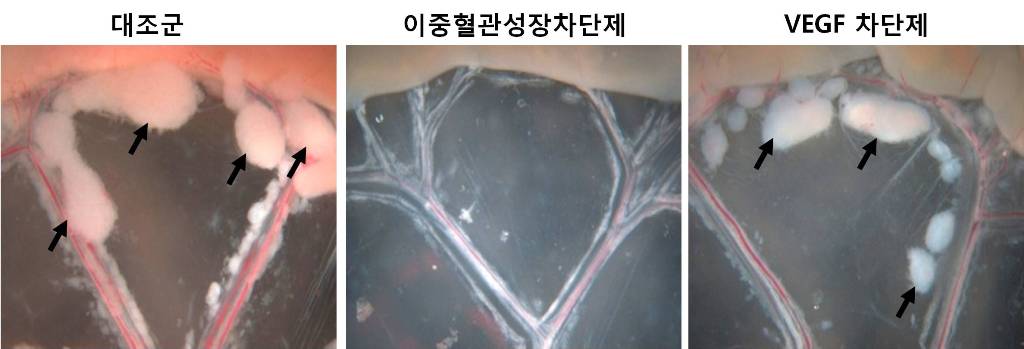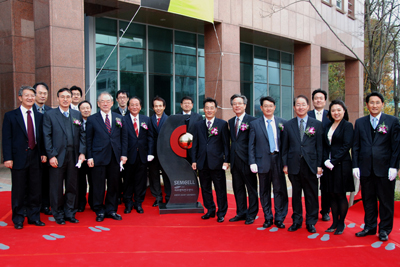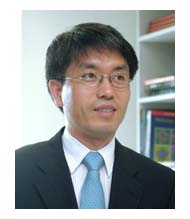cancer
-
 An internationally renowned academic journal published the research result produced by a KAST research team on its cover.
Fc DAAP VEGF-Trap
Photograph showing the gross features of tumor growth along the mesentery-intestinal border. T: tumor. Scale bars represent 5 mm.
Professor Gou-Young Koh of the Biological Sciences Department, KAIST, and his research team published their research result in Cancer Cell, a peer-review scientific journal, as a cover article dated August 17, 2010. It is the first time for the journal to pick up a paper written by a Korean research team and publish it as the cover.
It has been known that a vascular growth factor (VEGF) is closely related to the growth of a tumor. The research team recently discovered that in addition to VEGF, another growth factor, angiopoietin-2 (Ang2), is also engaged with the increase of tumors.
Professor Koh said, “VEGF and the angiopoietins play critical roles in tumor progression and metastasis, and a single inhibitor targeting both factors have not been available.”
The team led by Professor Koh has developed a double anti-angiogenic protein (DAAP) that can simultaneously bind VEGF-A and the angiopoietins and block their actions.
Professor Koh said in his paper, “DAAP is a highly effective molecule for regressing tumor angiogenesis and metastasis in implanted and spontaneous solid tumor; it can also effectively reduce ascites formation and vascular leakage in an ovarian carcinoma model. Thus, simultaneous blockade of VEGF-A and angiopoietins with DAAP is an effective therapeutic strategy for blocking tumor angiogenesis, metastasis, and vascular leakage.”
So far, cancer patients have received Avastin, anticancer drug, to inhibit VEGF, but the drug has not successfully restrained the growth of cancer tumors and brought to some of the patients with serious side effects instead.
Professor Koh said, “DAAP will be very effective to control the expansion of tumor growth factors, which will open up a new possibility for the development of more helpful cancer medicine with low side effects.”
2010.08.20 View 14509
An internationally renowned academic journal published the research result produced by a KAST research team on its cover.
Fc DAAP VEGF-Trap
Photograph showing the gross features of tumor growth along the mesentery-intestinal border. T: tumor. Scale bars represent 5 mm.
Professor Gou-Young Koh of the Biological Sciences Department, KAIST, and his research team published their research result in Cancer Cell, a peer-review scientific journal, as a cover article dated August 17, 2010. It is the first time for the journal to pick up a paper written by a Korean research team and publish it as the cover.
It has been known that a vascular growth factor (VEGF) is closely related to the growth of a tumor. The research team recently discovered that in addition to VEGF, another growth factor, angiopoietin-2 (Ang2), is also engaged with the increase of tumors.
Professor Koh said, “VEGF and the angiopoietins play critical roles in tumor progression and metastasis, and a single inhibitor targeting both factors have not been available.”
The team led by Professor Koh has developed a double anti-angiogenic protein (DAAP) that can simultaneously bind VEGF-A and the angiopoietins and block their actions.
Professor Koh said in his paper, “DAAP is a highly effective molecule for regressing tumor angiogenesis and metastasis in implanted and spontaneous solid tumor; it can also effectively reduce ascites formation and vascular leakage in an ovarian carcinoma model. Thus, simultaneous blockade of VEGF-A and angiopoietins with DAAP is an effective therapeutic strategy for blocking tumor angiogenesis, metastasis, and vascular leakage.”
So far, cancer patients have received Avastin, anticancer drug, to inhibit VEGF, but the drug has not successfully restrained the growth of cancer tumors and brought to some of the patients with serious side effects instead.
Professor Koh said, “DAAP will be very effective to control the expansion of tumor growth factors, which will open up a new possibility for the development of more helpful cancer medicine with low side effects.”
2010.08.20 View 14509 -
 KAIST Opens Cell Bench Research Center
KAIST opened a cell bench research center on the campus on Monday, Nov. 17, as a joint project with Samsung Electric Co. and Samsung Medical Center.
On hand at the opening ceremony were about 100 persons from the three organizations, including KAIST President Nam-Pyo Suh, Samsung Electric"s Chief Technology Officer (CTO) Byung-Cheon Koh and Samsung Medical Center Vice President Hyo-Geun Lim.
The newly-opened research center will be involved in the development of individually-tailored anti-cancer medicine using bio-inspired cell chips and technologies for clinical applications. Prof. Young-Ho Cho of the Department of Bio and Brain Engineering was named director of the research center.
"Top-notch professionals from the electronic industry, academia and the medical community have gathered together to establish this research center. We expect the center will open a new path for the science and technology community and the industry to combine their strengths and develop innovative anti-cancer therapeutics," said KAIST President Nam-Pyo Suh at the opening ceremony.
"The development of bio-cell chip technology represents a new challenge for the Samsung Electric which has focused on information technologies thus far. Through cooperation with KAIST and Samsung Medical Center, we expect to be able to develop a simple and efficient cure for cancer patients," commented Samsung Electric CTO Byung-Cheon Koh.
The research center will be initially concentrating on the development of cell chips for lung cancer, one of the primary causes of death for Koreans.
2008.11.17 View 19862
KAIST Opens Cell Bench Research Center
KAIST opened a cell bench research center on the campus on Monday, Nov. 17, as a joint project with Samsung Electric Co. and Samsung Medical Center.
On hand at the opening ceremony were about 100 persons from the three organizations, including KAIST President Nam-Pyo Suh, Samsung Electric"s Chief Technology Officer (CTO) Byung-Cheon Koh and Samsung Medical Center Vice President Hyo-Geun Lim.
The newly-opened research center will be involved in the development of individually-tailored anti-cancer medicine using bio-inspired cell chips and technologies for clinical applications. Prof. Young-Ho Cho of the Department of Bio and Brain Engineering was named director of the research center.
"Top-notch professionals from the electronic industry, academia and the medical community have gathered together to establish this research center. We expect the center will open a new path for the science and technology community and the industry to combine their strengths and develop innovative anti-cancer therapeutics," said KAIST President Nam-Pyo Suh at the opening ceremony.
"The development of bio-cell chip technology represents a new challenge for the Samsung Electric which has focused on information technologies thus far. Through cooperation with KAIST and Samsung Medical Center, we expect to be able to develop a simple and efficient cure for cancer patients," commented Samsung Electric CTO Byung-Cheon Koh.
The research center will be initially concentrating on the development of cell chips for lung cancer, one of the primary causes of death for Koreans.
2008.11.17 View 19862 -
 Prof. Chung Named Winner of 2008 KAIST Scientific Award
Professor Chung Jong-Kyeong of the Department of Biological Sciences was named the winner of the 2008 KAIST Scientific Award.
The prize was awarded by KAIST President Suh Nam-Pyo during the 37th KAIST anniversary ceremony on Feb. 16.
Chung was cited for disclosing the new anti-cancer aspect of adenosine monophosphate-activated protein kinase (AMPK). His papers, published in the science magazine Nature in 2006 and again in 2007, revealed that the protein could be used to treat certain forms of cancer, as well as prevent malignant growths.
2008.02.28 View 15647
Prof. Chung Named Winner of 2008 KAIST Scientific Award
Professor Chung Jong-Kyeong of the Department of Biological Sciences was named the winner of the 2008 KAIST Scientific Award.
The prize was awarded by KAIST President Suh Nam-Pyo during the 37th KAIST anniversary ceremony on Feb. 16.
Chung was cited for disclosing the new anti-cancer aspect of adenosine monophosphate-activated protein kinase (AMPK). His papers, published in the science magazine Nature in 2006 and again in 2007, revealed that the protein could be used to treat certain forms of cancer, as well as prevent malignant growths.
2008.02.28 View 15647